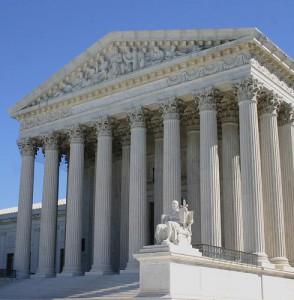Newly Full Supreme Court Addresses Religious Liberty

Now that the Supreme Court finally has its ninth Justice in Neil Gorsuch (after over a year of delays because of the Republican refusal to consider Obama nominee Merrick Garland), the court is processing pending cases in earnest.
One of these cases has the potential to drastically impact religious freedom in the United States. This case, Trinity Lutheran v. Comer, is perhaps the most significant religious freedom and religious liberty case before the US Supreme Court since Hobby Lobby.
According to Camille Mott from Slate:
[The case focuses on a Missouri program that] offers grants to help nonprofit organizations purchase rubber playground surfaces. Trinity Lutheran Church, which operates a preschool out of its church facilities, applied for a grant through the program but was rejected under a provision in the state constitution prohibiting state money from going directly or indirectly, in aid of any church, sect, or denomination of religion. The church sued, claiming the state’s denial constituted an unconstitutional burden on its free exercise of religion. Both sides in the case argue disastrous consequences will follow if the court rules against them. Religious groups contend that important social services, such as soup kitchens and women’s shelters, will be forced to shut down if Trinity Lutheran loses, while the state’s supporters caution a win for the church will erode the wall between church and state.
This case is part of a larger trend of religious organizations and advocacy groups claiming that they should be exempt from the laws of the land, whether those exemptions concern anti-discrimination regulations, healthcare mandates, childcare protections, or other areas. Some religious groups seem to be of the mindset that they should have their cake and eat it too; essentially, they should receive all of the benefits they desire from government, without abiding by the restrictions and regulations.
What’s truly at stake in this case is the United States’ position on whether houses of worship should be able to receive taxpayer funding, which include monies gathered from non-believers and followers of non-Abrahamic faiths, in order to allow for Christian schools to further their mission of educating children in the ways of their religion. And while most Americans can rationally see that such an action would not only be a violation of the First Amendment, but also an alienating government endorsement of religion in general through the allocation of funding, other Americans refuse to acknowledge that while they have the right to practice their faith, the government doesn’t have the obligation to monetarily support that faith.
Unfortunately, with the newly conservative tilt of the Supreme Court, it’s unlikely that those concerned with the separation of church and state and true religious freedom will prevail on their day in court. While Justice Sotomayor correctly claimed, “No one is asking the church to change its beliefs. The state is just saying it doesn’t want to be involved in giving public money to the church,” the conservative justices seemed to side with the house of worship. Even Justice Kagan, who was appointed by President Obama and is considered reliably liberal, claimed that the government was infringing upon the religious rights of the house of worship, stating, “You’re denying one set of actors from competing for the grant money because of religion.” Even so, humanists should continue to challenge unconstitutional practices. These legal challenges educate the public about the issue of church-state separation and could one day lead to the court revising its position on the issue.
